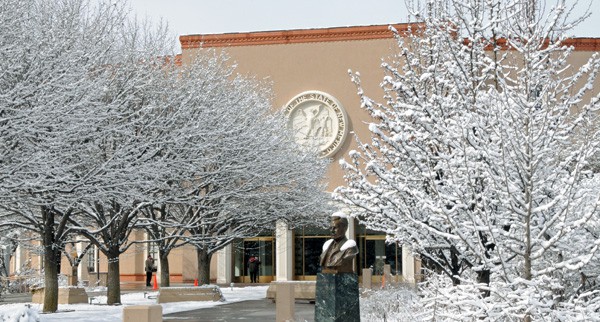
The Roundhouse in Santa Fe (Photo by Heath Haussamen)
It’s simply a misconception to believe that by keeping public salary information obscure, we are protecting public employees. I believe that what we are really protecting are illegal and unfair hiring practices that ultimately harm the public and the vast majority of public employees who are qualified and hard-working.
This is a follow-up to Welsh’s previous column, “Opposition to changing Sunshine Portal’s purpose.”

Sarah Welsh
Let’s talk about why the names of rank-and-file public employees are the public’s business, and why they should appear on the Sunshine Portal.
We all agree that government job titles and salaries are public information. But there’s a discomfort with the names. House Majority Leader Ken Martinez said Saturday that it’s voyeurism to want to see names, and that it represents an attack on public employees.
So why are the names anybody’s business? Because of nepotism and cronyism. Government jobs, from the cabinet secretary on down to the janitor, should be going to the best people for the job – the best-qualified and the hardest -working. Yet we all know what really happens all too often. Jobs are doled out to friends and supporters. One way to combat that is through sunshine – making sure that the hiring process is transparent.
And let’s be frank – nepotism and cronyism don’t stop with high-paying, high-responsibility positions. They go all the way down the pay scale. Back when I was a newspaper reporter, one of the first public-records investigations I ever did was about the hiring of summer interns in a public school district.
I got a tip that interns had been hand-picked by members of the school board – which is illegal. Rumor had it that at least one of the hired interns didn’t meet the minimum qualifications for the job. It turned out to be true – I got the documents through the Inspection of Public Records Act and published the story.
This is why the names of public employees are public – so elected officials can’t get away with stuffing friends and cronies into government jobs, at any level.
That same principle simply doesn’t apply to private-sector jobs. A general contractor or CPA or graphic designer working in the private sector is free to hire his son and give him a cushy job. It’s not illegal, and it’s not a scandal. No one would even be surprised.
The scandal is when it happens in government. The scandal is when the government hires some important person’s unqualified daughter, or when the government turns down a low bid and gives the contract to a campaign contributor charging a higher rate.
Making everyone a government watchdog
If we can agree that public-employee names are public, there’s still hesitation to go the next step, and post that information online. Many people feel that’s an unwarranted invasion of privacy. But public means public. If we want sunshine to disinfect, we have to actually put information out in front of people – lots of people, not just the select group of people who file IPRA requests.
If we rely on a small group of investigative reporters, attorneys, private investigators and committed citizen activists to investigate billions of dollars in government spending, a lot of illegal or unsavory hiring and contracting practices are going to remain in the dark. Public means public, and in 2012, that means online.
That tip about the student-intern hiring came through someone who was angry that bright, qualified students had been passed over. If I had said, “I don’t have time, I don’t care about a summer-intern program, and I have better things to investigate,” then the public body would have gotten away with it. The agencies I covered probably got away with countless other practices because there was no tipster.
But if the information were available on the Sunshine Portal, any parent or neighbor or teacher could look at it and bring these situations to light. Or even better, officials would avoid creating them in the first place.
That’s the point of the Sunshine Portal – to deputize and enable every citizen to become a government watchdog. It’s simply a misconception to believe that by keeping public salary information obscure, we are protecting public employees.
I believe what we are really protecting are illegal and unfair hiring practices that ultimately harm the public and the vast majority of public employees who are qualified and hard-working.
Welsh is executive director of the New Mexico Foundation for Open Government.